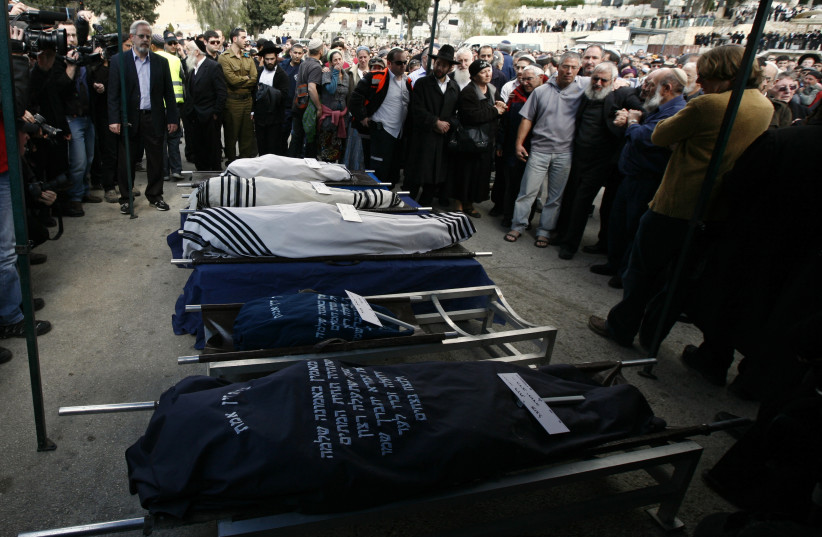Collapse, shock, and loss have seldom been more literal, cruel and swift.
Minutes after six-year-old Eitan Biran’s cable car climbed away from Lake Maggiore’s azure waters, the cable snapped, the car tumbled 20 meters into Monte Mottarone’s Alpine woods, and Eitan lost his father, mother, two-year-old brother and two of his great grandparents.
Some kids who lose both parents are luckier than others. Eleanor Roosevelt, whose parents died when she was eight and 10, was lucky to be raised by a loving grandmother with whom Roosevelt was close until her grandmother died.
Herbert Hoover, whose parents died when he was six and 10, was passed on from a grandmother to one uncle before settling with another uncle, whom he resented.
In this country, five-year-old Miri Firstenberg, who lost her parents in the 1954 terror attack on a bus at Ma’aleh Akrabim, was first with her grandparents, but they couldn’t take the emotional burden and moved her to a kibbutz that, as she later observed, could offer nothing like parental warmth.

The two surviving children of the 2011 massacre of the Fogel family in Itamar lost their parents and three siblings that night, but in terms of their orphanhood, they were luckier than Firstenberg, having been taken in by their grandparents who were then joined by an uncle, aunt and their children.
And in 2015, at the fresh graves of Eitam and Na’ama Henkin who were gunned down by terrorists outside Beit Furik, the grandparents said of the four surviving children, ages nine, seven, four, and eight months: “We will raise them together.”
This is not what happened to Eitan Biran.
EITAN ARRIVED in Italy one month old, when his father, Amit, went to study medicine at the University of Pavia. Amit’s sister, Aya, a doctor, lives in Italy with her husband, Or, and their two girls. The couple wants to adopt Eitan, who has known them all his life.
That is also the plan of Eitan’s aunt, Gali, sister of the dead mother who wants to raise the child with her husband, Ron, in Israel. “My sister, Tal,” she says, “wanted to return here.” Gali was joined in this quest by her father, Shmulik Peleg.
That gap alone reflected a kind of familial dysfunction this country had never seen under such circumstances, despite its extensive experience with children’s bereavement. But then the plot thickened further.
With Eitan hospitalized in Turin with severe injuries, local authorities declared Aya his temporary custodian. Shmulik, who flew in from Petah Tikva, now resolved to reboot the situation. Claiming he was taking Eitan for a day out, he drove the child to Switzerland, where he had prepared the private plane in which he now whisked the toddler to Israel.
This week the Tel Aviv Family Court ruled that Eitan will be returned to Aya and Or in Italy, and that Shmulik’s transfer of Eitan to Israel violated the 1995 Hague Convention concerning child abduction.
Shmulik just lost a daughter and a grandson, and has now also likely shattered his chances for custodian rights. He therefore deserves, and has, everyone’s sympathy. Even so, what he did was not only illegal but also immoral, just like his arguments are not only unconvincing but also revolting.
“I DIDN’T abduct him,” claimed the grandfather. “I saved him.”
It was part of a line of defense that was joined by his daughter and others from that side of the family. In Italy, they said, Eitan would attend a Catholic school and be severed from his Jewish roots and Israeli identity.
That is to say, the child’s real abduction is not the physical one for which his grandfather was placed under house arrest, but a spiritual captivity, a new version of the 1858 Edgardo Mortara scandal.
Back then, a Jewish child whose maid had secretly baptized was forcibly taken from his parents, who lived in Bologna that was then part of the papal realm. The Vatican insisted that since the child is Catholic he must be raised Catholic, and didn’t budge even in the face of pressure from American and European governments. Mortara lived the rest of his 88 years as a Catholic and died an Augustine monk.
This is not what Italy has in store for Eitan. His family there is also Jewish and Israeli, and its cause is backed by Italian-Jewish leader Emanuele Fiano, but more importantly, they and the setting in which they live are what Eitan has known all his life. The home they offer him there is the least painful transition from his past to his future, a version of the warm home that awaited the Fogel kids in Jerusalem when they left Itamar.
The grandfather’s statement regarding the legal situation – “I don’t understand about Hague Conventions, I am the child’s grandfather” – is no less canting, maybe more, and unfortunately brings to mind his conviction in 2003 of violent behavior toward his wife while they were getting divorced.
In short, the Italian side of the family has the stronger case. This does not mean they are morally impeccable.
The Israeli side’s suggestion that the massive insurance payments Eitan deserves should be locked in a trust fund until he is 18 and then go to him – has yet to be joined by Aya and her husband.
Shmulik’s charge – that he was sidelined when Aya negotiated her temporary custodianship with Italian authorities – may or may not be accurate. It does, however, reflect both families’ unfathomable failure to set their differences aside and jointly rehabilitate the injured child that God has placed between them fatherless, motherless, brotherless and traumatized for the rest of his days.
As of now, both families’ failure to jointly build Eitan’s future means that rather than become his trauma’s cure they are his calamity’s extension, and a disgrace to us all.
The writer’s bestselling Mitzad Ha’ivelet Ha’yehudi (The Jewish March of Folly, Yediot Sefarim, 2019), is a revisionist history of the Jewish people’s leadership from antiquity to modernity.
